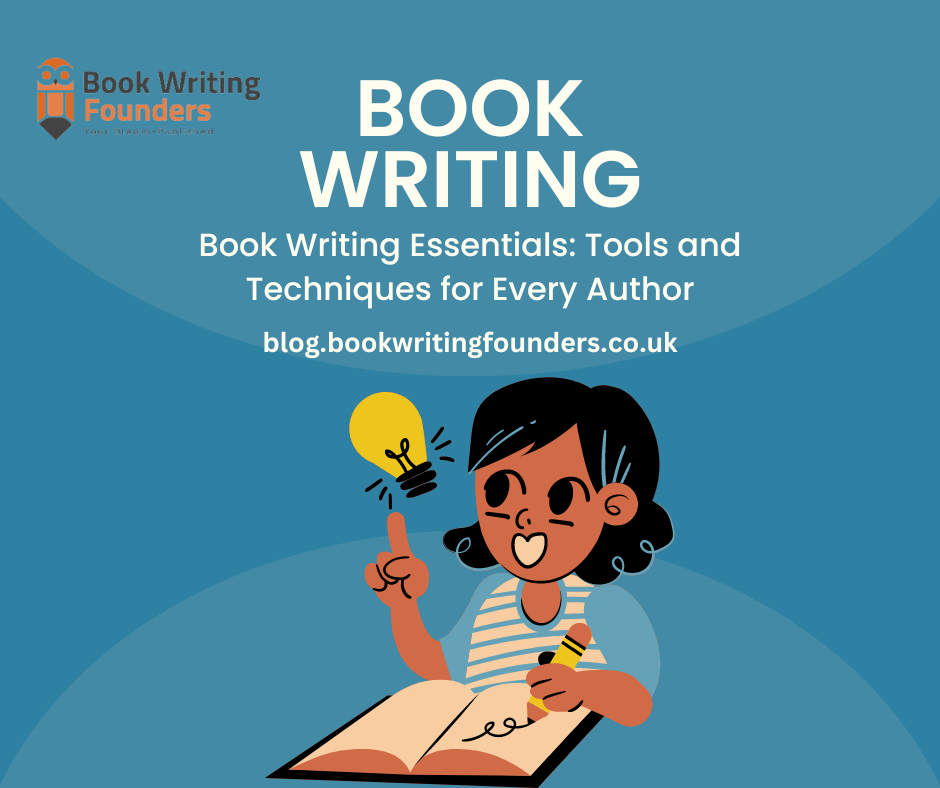
Writing
Successful authors often draw inspiration for book writing from their experiences, personal challenges, or societal issues to create relatable and authentic stories.
Techniques such as observing the world around you, keeping a journal, and engaging in stimulating conversations can also serve as wellsprings of inspiration.
Streamlining Your Workflow: Utilizing Tools and Techniques
1. Develop A Strong Concept and Outline
A strong idea and a clear plan are the first steps in writing a book. This will not only help you plan your writing guide, but it will also make sure that your book is well-organized and always interesting.
Choose a Genre:
Figure out what kind of people you want to reach and pick a genre you’re really into. With this much-needed drive, it will be much easier to keep going when things get tough while book writing.
Brainstorm Ideas:
Write down all the ideas that come to mind. You might find it helpful to set aside time for this activity and look at writing ideas, current events, or your own life to get creative.
Select A Core Theme or Message:
Consider what you want your narrative to say and determine the main idea. This will strengthen your story and help your readers connect with the book.
Develop an Outline:
List what each part will cover, then divide your business book writing into chapters. Not only will this give your writing structure, but it will also help you get your thoughts and ideas in order.
2. Set A Realistic Writing Schedule
Consistency and discipline are paramount to completing your book. Set a writing schedule that suits you, and stick to it.
Determine Your Daily Word Count Goal:
Decide on a reasonable daily word count goal and work slowly but surely toward finishing your book.
Establish A Writing Routine:
Set aside regular periods for writing routines throughout the day or week to write. Make yourself home in a quiet, undisturbed space where you can give your whole attention.
Break Your Writing Sessions into Manageable Chunks:
Book writing for long periods can be exhausting. Split your work sessions into smaller time blocks with short breaks to maintain your productivity and energy levels.
Celebrate milestones:
Acknowledge and celebrate the completion of specific chapters, word count goals, or other milestones. This will keep you motivated and serve as an encouragement to continue.
3. Use writing tools and software
Various writing tools and software are available to make the process more efficient and organized.
Word Processors:
Choose a word processor like Microsoft Word, Google Docs, or Scrivener to write and format your manuscript.
Writing Apps:
Try using apps suggested by Book Writing Founders UK, like Ulysses, Evernote, or Turtl, to make writing easier, keep your notes in order, and view them from different platforms.
Grammar and Style Checkers:
Grammarly, ProWritingAid, or Hemingway Editor can help you refine your manuscript by identifying grammatical errors, suggesting improvements, and analyzing the readability of your text.
Reference and Research Tools:
Use reference management tools for book writing like Zotero or Mendeley to save and organize research material and citations.
Distraction-Free Writing Environments:
Write in full-screen mode or utilize apps like FocusWriter or OmmWriter to minimize visual distractions and enhance focus and productivity.
4. Consider Character Development and World-Building
Characters and the worlds they inhabit play a crucial role in engaging your readers and making your story come alive.
Create Memorable Characters:
Create interesting, three-dimensional figures with their personalities, wants, and pasts. People who care about your characters will care more about their experiences.
Employ Character Arcs:
Ensure your characters evolve throughout your story to keep readers engaged and invested in their development.
Feel The Setting:
Immerse your reader in your story’s setting by vividly describing the physical environment, culture, and history – but avoid overwhelming them with unnecessary information.
Establish Consistent Rules:
When creating a fictional world, establish rules governing its reality, magic systems, technology, or social structures to maintain plausibility and consistency.
5. Practice Effective Editing and Revision
Revising and editing your manuscript is essential to book writing and helps create a polished and refined book.
Break Editing into Stages:
Separate the editing process into multiple stages to focus on specific aspects, such as content, structure, consistency, grammar, and formatting.
Get Feedback from Others:
Share your manuscript with friends, family, or beta readers for external input and constructive criticism.
Consider A Professional Editor:
Hiring a professional editor can be invaluable to perfect your manuscript and identify weaknesses that might be difficult to spot yourself.
Revise Ruthlessly:
Sometimes, trimming your work of unnecessary elements or rewriting sections may be necessary to present a more coherent and impactful story.
6. Seek Inspiration and Learn from Others
Read widely, analyze various writing styles and storytelling techniques, and absorb lessons that can be applied to your book writing. Studying the works of successful authors in your genre can provide valuable insights, inspiration, and motivation.
Read Other Books:
Read books similar to your chosen genre to better understand the conventions, tropes, and reader expectations. Take notes on the aspects you find effective or engaging and identify areas of improvement to apply to your writing.
Learn from Writing Resources:
Explore writing guides, blog posts, and podcasts to deepen your understanding of writing techniques and industry knowledge. Keep an open mind; book writing is a lifelong learning process, and each new resource can yield valuable insights.
Join Writing Communities:
Participate in writing groups, workshops, or online forums where you can share your work and receive peer feedback. This strengthens your writing skills and creates a supportive network for motivation, collaboration, and networking opportunities.
Attend Writing Events and Conferences:
Engaging with authors and industry professionals at writing events and conferences can provide valuable advice, connections, and guidance on publication.
7. Nurture A Strong Author’s Mindset
Writing a book takes dedication, perseverance, and resilience. A strong mental attitude can help you overcome obstacles, maintain focus, and complete your project.
Embrace The Writing Process:
Accept that book writing is a process that includes moments of frustration and doubt. Celebrate your progress, embrace the challenges, and accept that the journey requires dedication to see through to completion.
Adopt A Growth Mindset:
Be open to learning, improving, and adapting your writing style, approach, and techniques. Recognize that every writing experience is an opportunity for growth and refinement.
Handle Criticism Constructively:
Embrace constructive feedback and criticism but understand the difference between well-founded suggestions and unnecessary negativity. Apply the helpful feedback to improve your manuscript and discard the input that doesn’t serve your book’s purpose.
Overcome Writer’s Block:
Find your unique strategies for managing writer’s block, such as changing your environment, indulging in creative exercises, discussing plot dilemmas, or taking a break to recharge.
8. Understand The Publishing Landscape
Educate yourself on the various publishing options available to determine the best path for your book.
Traditional Publishing:
Research literary agents and publishing houses that cater to your genre. Write an enticing query letter and book proposal to pitch your manuscript. Understand that the traditional publishing route involves high competition and may require patience.
Self-Publishing:
Consider platforms like Amazon Kindle Direct Publishing, IngramSpark, or Draft2Digital to publish your book independently. Remember that self-publishing requires an investment in editing, cover design, marketing, and distribution but offers increased creative control and revenue.
Hybrid Publishing:
Explore the hybrid publishing model, which combines elements of both traditional and self-publishing. Research reputable hybrid publishing companies to collaborate with on editorial, design, distribution, and marketing services while maintaining some creative control.
Understand Contracts and Royalties:
Familiarise yourself with contracts, copyrights, royalties, and other financial aspects of the publishing industry to ensure that you make informed decisions.
Some Famous Writing Tools:
Scrivener: A feature-rich writing program for long-form writing, such as novels, screenplays, and research papers. Celebrated for its organizational capabilities.
Evernote: A powerful note-taking application that can capture, organize, and store various content, including text, images, and web pages. Excellent for organizing research and ideas.
750 words: An online platform that encourages daily writing with a goal of 750 words per day. Great for creating and maintaining a regular writing habit.
ProWritingAid: A comprehensive editing tool that checks for grammar, style, readability, repetition, and other potential issues in your writing.
Hemingway: A user-friendly book writing and editing app that helps streamline and enhance your writing by highlighting complex sentences, passive voice, and unnecessary adverbs.
Readability Score: An online platform that analyzes and scores text clarity, making it an effective tool for ensuring your writing is accessible and understandable.
Thesaurus: An invaluable resource for synonyms and antonyms, helping to diversify and enrich your vocabulary.
Conclusion:
Each tool embodies a unique functionality that can simplify different aspects of your writing journey. To maximize their benefits, evaluate your needs and explore the capabilities of each tool to find which ones are best fit for your writing process.
Simultaneously, immersing in the different techniques, such as maintaining a structured writing schedule, seeking feedback, and fostering a strong author’s mindset, can significantly uplift your abilities and hone your craft.





